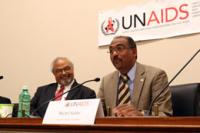
(L to R): Krista Lauer, AIDS Project Los Angeles, Dr Cheikh E. Traoré, Sexual Diversity, UNDP Senior Advisor, Tudor Kovacs, Population Services International, Romania, Ambassador Eric Goosby, U.S. Global AIDS Coordinator and UNAIDS Executive Director Michel Sidibé.
Photo credit: UNAIDS/Jati Lindsay
As part of his official visit to Washington, D.C., UNAIDS Executive Director Michel Sidibé participated in the Forum on HIV, Human Rights and Men Who Have Sex with Men on 16 September 2009. The event was organized by UNAIDS in collaboration with the HIV Policy Working Group on Men Who Have Sex with Men and Other Sexual Minorities, and in cooperation with the Honorable Howard Berman (D-CA) and the Honorable Barbara Lee (D-CA).
The Forum was held to raise attention to the human rights issues that affect men who have sex with men (MSM) and other sexual minorities, as well as the policy and structural barriers that prevent MSM and other sexual minorities from accessing HIV services, including prevention, treatment, care and support.
We are here because it remains an undeniable fact in all regions of the world—including here in the US—that men who have sex with men lack universal access to HIV services.
UNAIDS Executive Director Michel Sidibé
“We are here because it remains an undeniable fact in all regions of the world—including here in the US—that men who have sex with men lack universal access to HIV services,” said Michel Sidibé.
The meeting also facilitated a conversation on how US policy makers and AIDS organizations could support PEPFAR countries in national AIDS responses that are relevant to men who have sex with men.
“If we are to see a renewed emphasis on human rights in the proposed Global Health Initiative and if we are to see commitment to MSM programming in PEPFAR II—we need to see unwavering leadership,” said Sidibé.
UNAIDS Executive Director Michel Sidibé shared the platform with Ambassador Eric Goosby, U.S. Global AIDS Coordinator. Other speakers included Jaevion Nelson, Jamaica Youth Advocacy Network, Dr Cheikh E. Traoré, Sexual Diversity, UNDP Senior Advisor, Tudor Kovacs, Population Services International, Romania and Krista Lauer, AIDS Project Los Angeles. Evelyn Tomaszewski of the National Association of Social Workers moderated the forum.

Ambassador Eric Goosby, U.S. Global AIDS Coordinator and UNAIDS Executive Director Michel Sidibé during the UNAIDS Forum on HIV, Human Rights and Men Who Have Sex with Men. Washington, September 16, 2009.
Photo credit: UNAIDS/Jati Lindsay
According to UNAIDS, unprotected sex between men accounts for between 5% and 10% of global HIV infections, although the proportion of cases attributed to this mode of transmission varies considerably among countries. It is the predominant mode of HIV transmission in much of the developed world.
Evidence-based research demonstrates that providing HIV services to men who have sex with men helps to reduce the rate of HIV infection among this at-risk group. In many communities taboo and stigma towards men who have sex with men forces them to conceal their sexual practices which in turn may put their female partners at risk of HIV infection. Additionally, criminalizing men who have sex with men excludes them, or encourages them to exclude themselves, from accessing HIV related services out of fear.
In the coming months, UNAIDS and its partners will host a series of events on three high risk, marginalized populations: men who have sex with men, people who inject drugs, and sex workers. These meetings will build understanding of the importance of addressing the human rights needs of marginalized populations within the global AIDS response. The events will address policy and programmatic issues to increase awareness among AIDS policy and advocacy organizations to better address the needs of marginalized populations. The MSM event was the first of this series. UNAIDS will host the next Policy Forum on Sex Workers on 15 October 2009.




 (L to R): Krista Lauer, AIDS Project Los Angeles, Dr Cheikh E. Traoré, Sexual Diversity, UNDP Senior Advisor, Tudor Kovacs, Population Services International, Romania, Ambassador Eric Goosby, U.S. Global AIDS Coordinator and UNAIDS Executive Director Michel Sidibé.
(L to R): Krista Lauer, AIDS Project Los Angeles, Dr Cheikh E. Traoré, Sexual Diversity, UNDP Senior Advisor, Tudor Kovacs, Population Services International, Romania, Ambassador Eric Goosby, U.S. Global AIDS Coordinator and UNAIDS Executive Director Michel Sidibé.  Ambassador Eric Goosby, U.S. Global AIDS Coordinator and UNAIDS Executive Director Michel Sidibé during the UNAIDS Forum on HIV, Human Rights and Men Who Have Sex with Men. Washington, September 16, 2009.
Ambassador Eric Goosby, U.S. Global AIDS Coordinator and UNAIDS Executive Director Michel Sidibé during the UNAIDS Forum on HIV, Human Rights and Men Who Have Sex with Men. Washington, September 16, 2009.